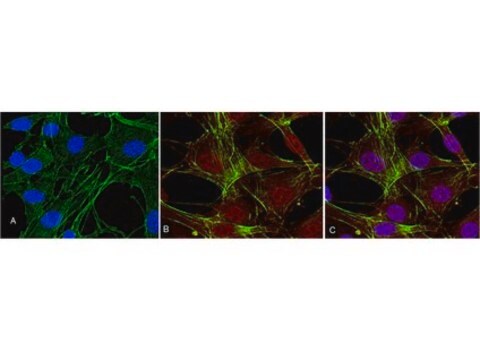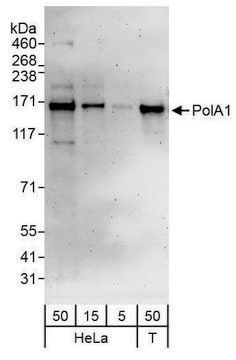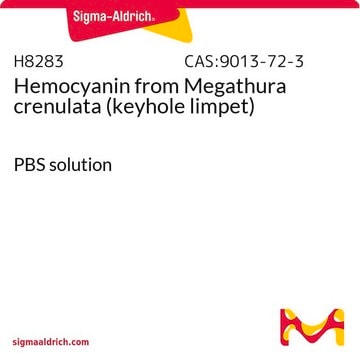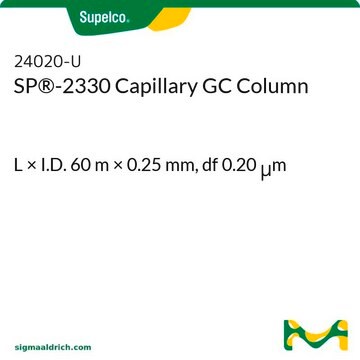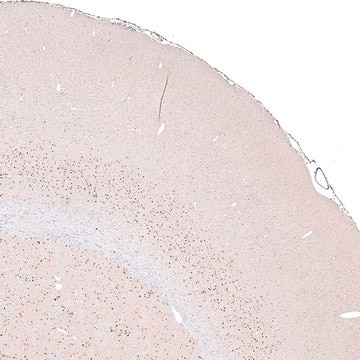ZRB2434
Anti-PALS1 Antibody, clone 3F20 ZooMAb® Rabbit Monoclonal

recombinant, expressed in HEK 293 cells
Synonyme(s) :
MAGUK p55 subfamily member 5, Membrane protein palmitoylated 5, Protein PALS1, Protein associated with Lin-71
About This Item
Produits recommandés
Source biologique
rabbit
Niveau de qualité
Produit recombinant
expressed in HEK 293 cells
Conjugué
unconjugated
Forme d'anticorps
purified antibody
Type de produit anticorps
primary antibodies
Clone
3F20, recombinant monoclonal
Description
recombinant, expressed in HEK 293 cells
Gamme de produits
ZooMAb® learn more
Forme
lyophilized
Produit purifié par
using Protein A
Espèces réactives
mouse, canine, human, rat
Conditionnement
antibody small pack of 25 μL
Caractéristiques du produit alternatif plus écologique
Waste Prevention
Designing Safer Chemicals
Design for Energy Efficiency
Learn more about the Principles of Green Chemistry.
Validation améliorée
recombinant expression
Learn more about Antibody Enhanced Validation
sustainability
Greener Alternative Product
Technique(s)
affinity binding assay: suitable
immunohistochemistry: suitable
western blot: suitable
Isotype
IgG
Séquence de l'épitope
C-terminal half
Numéro d'accès Protein ID
Numéro d'accès UniProt
Conditions d'expédition
ambient
Température de stockage
2-8°C
Informations sur le gène
human ... PALS1(64398)
Description générale
Spécificité
Immunogène
Application
Evaluated by Western Blotting in U2OS cell lysate.
Western Blotting Analysis: A 1:1,000 dilution of this antibody detected PALS1 in U2OS cell lysate.
Tested Applications
Western Blotting Analysis: A 1:1,000 dilution from a representative lot detected PALS1 in lysates from HeLa, and MDCK cells, and in Mouse brain and Rat brain tissue lysates.
Western Blotting Analysis: A 1:1,000 dilution from a representative lot detected PALS1 in lysate from wild-type Caco2 and MDCK cells, but not in lysate from PALS1 knockout MDCK cells.(Data courtesy of Dr Michael Krahn from University Hospital of Munster in Germany).
Immunohistochemistry (Paraffin) Analysis: A 1:100 dilution from a representative lot detected PALS1 in Human small intestine tissue sections.
Affinity Binding Assay: A representative lot of this antibody bound PALS1 peptide with a KD of 1.0 x 10-12 in an affinity binding assay.
Note: Actual optimal working dilutions must be determined by end user as specimens, and experimental conditions may vary with the end user.
Description de la cible
Forme physique
Reconstitution
Stockage et stabilité
Autres remarques
Informations légales
Clause de non-responsabilité
Vous ne trouvez pas le bon produit ?
Essayez notre Outil de sélection de produits.
Code de la classe de stockage
11 - Combustible Solids
Classe de danger pour l'eau (WGK)
WGK 1
Point d'éclair (°F)
Not applicable
Point d'éclair (°C)
Not applicable
Certificats d'analyse (COA)
Recherchez un Certificats d'analyse (COA) en saisissant le numéro de lot du produit. Les numéros de lot figurent sur l'étiquette du produit après les mots "Lot" ou "Batch".
Déjà en possession de ce produit ?
Retrouvez la documentation relative aux produits que vous avez récemment achetés dans la Bibliothèque de documents.
Notre équipe de scientifiques dispose d'une expérience dans tous les secteurs de la recherche, notamment en sciences de la vie, science des matériaux, synthèse chimique, chromatographie, analyse et dans de nombreux autres domaines..
Contacter notre Service technique